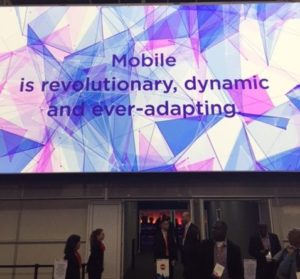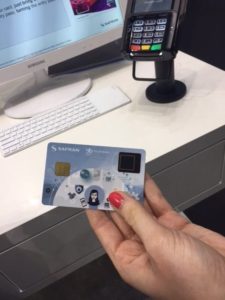 We are at Mobile World Congress 2017 in Barcelona this week, where biometrics and mobile authentication are bigger than ever before and the world’s top minds in mobility are championing the 5G future. Taking the keynote stage Monday morning to present the opening remarks of the conference, GSMA Director General Mats Granryd outlined his organization’s vision of the next generation of connectivity, stating: “5G is much more than a generational change; it’s a giant step forward in the global race to digitize economies and societies.”
We are at Mobile World Congress 2017 in Barcelona this week, where biometrics and mobile authentication are bigger than ever before and the world’s top minds in mobility are championing the 5G future. Taking the keynote stage Monday morning to present the opening remarks of the conference, GSMA Director General Mats Granryd outlined his organization’s vision of the next generation of connectivity, stating: “5G is much more than a generational change; it’s a giant step forward in the global race to digitize economies and societies.”
“It will connect people, machines, and things on a massive scale,” said Granryd, asserting that we are currently on the cusp of the 5G era. “We believe that 5G will connect and support up to one million connected devices per square kilometer in major cities.”
The connected future Granryd illustrated will be familiar to Mobile ID World readers—Internet of Things, VR, wearable tech enabling augmented reality, connected cars and smart automotive tech, greater industrial automation. And where these innovations go, the need for mobile authentication solutions will follow. Granryd mentioned the expanding GSMA Mobile Connect authentication specifications in his opening speech, saying it now boasts over 65 million users.
In tandem with the 5G-focused opening remarks, the GSMA released a new report, The 5G Era: Age of Boundless Connectivity and Intelligent Automation. It is based on extensive survey data and forecasts the initial deployment of commercial 5G networks circa 2020. The report is available through GSMA’s website.
Fingerprints and Contactless Biometrics on Day 1 of MWC

Mobile Connect wasn’t the only authentication solution making a buzz on Monday. Biometrics made huge waves in Barcelona, with a number of big developments specifically surfacing in the ongoing competition over the mobile fingerprint sensor market. Huawei launched a new handset with an under-glass sensor—an FPC1268 to be precise. Egis Tech launched its own under-glass sensor model and Goodix made good on last week’s promises by unveiling the world’s first in-display fingerprint sensor. Meanwhile, on the exhibition floor, we caught up with Safran Identity & Security and got a look at its biometric smartcard (pictured right).
It wasn’t all fingerprints either. While Samsung is breaking tradition and not launching its next flagship Galaxy smartphone at MWC this year, the Korean OEM did have its share of big mobile biometrics news. The company’s new Galaxy Book tablet, which was announced along with a partnership with Microsoft, leverages Windows Hello for biometric authentication.
On top of that, we reported on Qualcomm’s new Snapdragon processor which supports iris recognition from EyeLock, and our sister site FindBiometrics just recently reported on a partnership between Egis Tech and IriTech that will be bringing multimodal biometrics to the 5G enabled sector mentioned above, namely AR, VR, and automotive.
Stay tuned to Mobile ID World throughout the week as we continue to bring you our Mobile World Congress coverage straight from Barcelona.

Follow Us